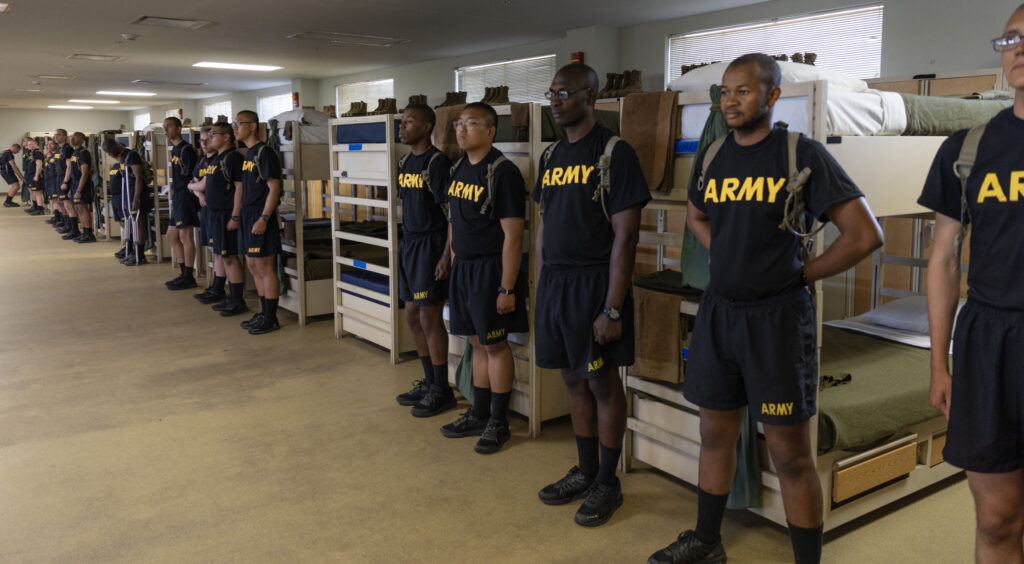Hooah!! Welcome to the U.S. Army family. My name is Sergeant Major Kris Broadus—but you can call me Kris. I’m here to help you understand exactly what happens at Army Basic Combat Training (BCT) over the next 10 weeks.
I’ve spent 25 years in the Army leading America’s sons and daughters, and I’m now using this experience to help new Army families and friends understand the BCT journey from citizen to Soldier.
Over the next 10 weeks, I’ll share weekly updates about what your Trainee is experiencing during their transformation into a Soldier. This path is tough and demanding, but at the end, your Trainee will have EARNED the title U.S. Army Soldier.
TRANSFORMATION BEGINS
By now your Trainee has left Reception and they have arrived at their BCT Unit. While in Reception, your Trainee swapped out their civilian clothes for Army uniforms, received haircuts, and may have made a brief phone call home. They learn about grooming, uniform standards, barracks upkeep, and conduct. They received medical and dental checks to ensure they’re fit for the rigorous training ahead. They are also onboarded with pay and everything else they need to start their Army career.
This is a difficult period for your Trainee. For the first time in many of their lives, they are without a cell phone, around new people, and are in an environment that is completely foreign to them. If they sound a little down or nervous, don’t worry, it is completely normal.

There are four phases to Army Basic Combat Training, Yellow, Red, White, and Blue. Before the official start of BCT, your Trainee was picked up at Reception by their Drill Sergeants and conducted their first test, The First 100 Yards.
THE FIRST 100 YARDS
The first week begins with the Trainees meeting the Drill Sergeants (DS), who will be responsible for their training throughout BCT. This is not your traditional first impression handshake; it’s an intense time for the trainees as the Drill Sergeants receive them from the Reception Battalion and they embark upon their first challenge in the Army, the First 100 Yards.

The meaning behind the First 100 Yards dates to World War I, when Infantry Soldiers left the protection of the trench and went across the battlefield to engage the enemy. Leaving the safety of the trench meant that they had faith in their leadership and the Soldier beside them as they charged the enemy positions. In similar fashion, the new Trainees must learn to trust their new Platoon and their Drill Sergeants as they face the challenges ahead of them.
Upon arrival at the drop off point, trainees are divided into Platoons and given a brief introduction to drill and ceremonies. Once in formation, they will be introduced to their Cadre and given a history lesson on their new unit.
As we navigate on this remarkable journey together, let’s break down the process, starting with the first critical step: Week One.
WEEK 1 EXPECTATIONS – YELLOW PHASE
During week one, Trainees are subject to total control, and every action is monitored and constantly corrected by their DS. As a result, trainees are often subjected to group corrective action, even for minor infractions. This is so that all trainees develop an acute attention to detail, and foster a sense of common responsibility among the unit.
The majority of this week will be spent in a classroom setting. Here they will begin to learn the basic principles of the Army. They will spend time learning about the Army Profession, Equal Opportunity, and Customs and Courtesies. Both the Army Values and the Warrior Ethos must be memorized by the end of the first week of BCT. Trainees can remember the Army Values – Loyalty, Duty, Respect, Selfless Service, Honor, Integrity and Personal Courage – by using the acronym LDRSHIP. They’ll have to be a bit more creative when it comes time to learn the Warrior Ethos, which states:
I will always place the mission first.
I will never accept defeat.
I will never quit.
I will never leave a fallen comrade.
The normal day for your Trainee will begin with a 0500 hours wake up and Physical Readiness Training (PRT) starting at 0530 hours. Once the morning’s exercise is complete, they will move on to breakfast and personal hygiene time. The day’s training normally will start promptly at 0800. The day will be full of training activities and lessons. A normal day for your Trainee will commence at 2000 and they will have an hour of personal time. This is when they will be able to write letters home and prepare themselves for the next day. Lights out is at 2100 and trust me, they will be ready to go to sleep for some well deserved rest.
LETTERS FROM HOME = MORALE
Your support as family and friends is invaluable. Letters of encouragement can significantly boost their morale, helping them persevere to graduation. If you’re unsure what to write, start with simple questions about their daily experiences or opt for the Daily Drive letter add-on for consistent support.
Although Sandboxx letters arrive the next day with return stationery, a pre-addressed envelope, the return postage paid, photos, and a gift card feature, don’t feel like you have to use Sandboxx to send letters. We encourage handwritten letters and cards – these are super important.
THE MAKING OF YOUR SOLDIER
Stay tuned for more insights into Week Two and beyond. Follow us on social media for the latest updates, letter ideas, and more.
That’s a brief look at the intense but rewarding journey your Trainee is on. Let’s keep supporting them every step of the way!
You can always find me via chat in the Sandboxx app or happiness@sandboxx.us — just ask for Kris, and myself or another teammate will get back to you as soon as we can.
Hooah!
SGM Kris Broadus, U.S. Army (Ret)
